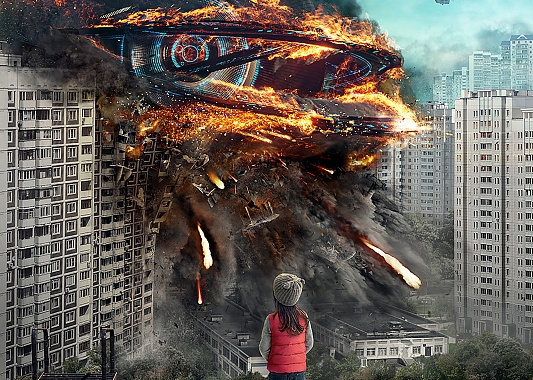Russia’s Soft Power in the Seventh Art. The Film Attraction
In
Log in if you are already registered
At the beginning of this year the film Attraction started showing in Russian cinemas. One of Russia’s first science fiction films which can be compared, regarding the budget and technology, to Hollywood blockbusters. In Soviet cinematography the genre of science fiction has always been popular. Kin-dza-dza![1] and Solaris[2] are two films that can be put side to side with western Hollywood films of that genre in the twentieth century. We can freely say that Attraction, in some of its elements, is a worthy successor of the communist futurism.
Taking into account the big amount of money that was invested in the film, the people behind the project had profit and entertainment in mind, which means that the target group are the broad masses that come into the cinema primarily to have fun and relax after a hard day of labor. The film manages to keep the viewer tense and suspended for two hours, which is by itself a success, having in mind how hard it is to maintain people’s attention nowadays.

It is a plan to broadcast the film in other countries as well, primarily in the west and in China. Working under the assumption that the viewers know that the film comes from Russia, the film creates the opportunity for Russia, as an object of negative media propaganda, to objectively inform vast number of people about its position in terms of basic international issues. For that reason the film represents a specific type of soft power – country’s ‘informational resources’ by means of which political, ideological and cultural influence can be exerted in the external environment. The analysis is focused on the political influence in international relations that a film can produce, and which concerns the main principles that are used to regulate crisis situations in today’s world. The classical principles that exist in foreign policies of western countries in the film were called into question in a logical and simple way, and Russian principles are used as the alternative.
1. Meddling into the sovereignty and integrity of independent countries
Even if aliens attacked the territory of some country, the sovereignty would still be the most important principle in international relations and every other country would have to respect that. When a space ship crashes, the international community, through the United Nations Security Council tries to make a decision that opposes the Russian strategy and that is why Russia, as an independent country, uses the right of veto and does not allow foreign interference, which would lead to aggravation and bigger complexity of the situation. They promote having relations between countries guided by the principles of independence and sovereignty[3]. It is one of Russia’s main principles in foreign policy doctrine.

2. The dialogue between civilizations
The uninvited guests have crashed on Earth and caused great material damage and human victims in the process. Russia, as the representative of civilization, from the moral and legal standpoint, has the right to act from a position of force. However, Russian state leaders decide to enter into dialogue with the other side first. Because of the language barrier, communication practically does not exist, but the authorities are trying everything in their power to solve the problem by communicating and in a peaceful manner. If we look at the American paradigm in art and in reality, we come to the conclusion that dialogue does not exist at all, but only the battle between ‘good and evil’. On one side of art the film ‘Independence Day’, one of the most popular films about aliens in the US, represents the battle to total extinction between planetary civilizations without dialogue. On the other side, in real life, the west neglects the fact that there are different cultural and historical types (civilizations) on this planet, which are different in their degree of development, cultural and moral values. Blinded by their technological achievements, they believe in their superiority and righteousness. According to them, the whole world is divided into the civilized west and the rest, who should copy and imitate the promoted values, regardless of the fact that they are not balanced with their tradition. American president George Bush kept repeating the slogan ‘You are either with us or against us’[4], thus separating the world into civilized countries and Barbarians as the personification of evil against whom the US has to wage war. For that reason, for the first time in Russian doctrine of foreign policy, the term civilization as a supranational cultural phenomenon is introduced, as a way to further the evolution of the international system. The main objective of Russian foreign policy is to facilitate the development of constructive dialogue and partnership, with a view to promote harmony and mutual enrichment among various cultures and civilizations.[5]
3. Racism
The director, without hesitation, tries to show the birth of stereotypes and hatred against others, using the example of young Russians. Namely, because of the fall of spaceship, the victims that were accidentally left behind and the inability to communicate , the young feel uneasy, out of which, through manipulation for different interests, an opinion is formed which is equal to racism, with the slogan ‘This is our Earth’. Emotions get involved into all that and the situation gets out of control. It is in human nature to have fears and phobias against something unknown and sometimes that is what kept us alive, but current phobias and stereotypes against other nations and races bring us completely back into the history full of wars and suffering. In World War II Russia has lost many men and felt, on their skin, the fatalness of an ideology that can never happen again. For that reason, Russia suggested a resolution in the United Nations in 2014 called: Combating glorification of Nazism and other practices that contribute to fuelling contemporary forms of racism, racial discrimination, xenophobia and related intolerance.[6]
.jpg)
4. Democracy
Russia, in Soviet time and now, is considered the embodiment of authoritarianism and totalitarianism. That fact alone gives rise to countless criticism on behalf of the Russian Federation. In the film we can see that democratic principles in the implementation of some major decisions are actually not the best approach. The young aggressive opponents of the neighbors from the other planet use modern technologies and social networks to mobilize and manipulate the broad masses. That causes a real rebellion between citizens, not only against the aliens but also against the country’s armed forces. The film questions the basics of democracy in contemporary world in which it is easy, by using the internet, to create ‘critical masses’, based on false information. For that reason the people can easily succumb to different illusions, stereotypes and intolerance.
Next to the hidden subliminal messages of political nature which are prominent in the analysis that are in the background, special effects and the tense atmosphere are in the foreground. The viewers will not regret watching the film as it completely satisfies all the criteria of a real blockbuster, and for those more informed about the international situation it will make the viewer doubt the righteousness of their stereotypes the next time a confrontation between different nations occurs. In today’s world of modern technologies and informational wars, this is the only way to reach the people who live in different ‘filter bubbles’. For the promotion of soft power it is not enough only to use accidental parallels and reliance on director’s intuition, but also planned implementation of foreign policy doctrines in every segment of mass art.
[1] Kin-dza-dza, dir. by Georgiy Daneliya 1986.
[2] Solaris, dir. by Andrei Tarkovski 1972.
[3] The Ministry of Foreign Affairs of the Russian Federation, Foreign Policy Concept of the Russian Federation, (Moscow 2016)
[4] Georgy Bush, 'Address to a Joint Session of Congrees and the American People', White House 2003
[5] The Ministry of Foreign Affairs of the Russian Federation, Foreign Policy Concept of the Russian Federation, (Moscow 2016)
[6] 'UN Adopts Russia-Proposed Resolution Against Nazism Glorification', Sputnik 18.12.2015 http://sptnkne.ws/c98h




